| Band: | Sumerian Tombs |
| Album: | Sumerian Tombs |
| Genre: | Black Metal |
| Country: | Germany |
| Release Date: | 18th of March, 2022 |
| Released via: | Ván Records |
| Coverart: | Ben Harff |
With their first demo, Cologne-based Black Metal combo Sumerian Tombs furiously played their way into my heart so damn fast, that it immediately rushed into my Top Releases list of 2021 although having been relased in December. Hence, I was eagerly waiting for the already announced follow-up full-length debut via Ván Records. After having convinced on this album as well, I was interested in asking some questions about the sound of Sumerian Tombs, the releases, their production and the labels involved.
Interview with Sumerian Tombs
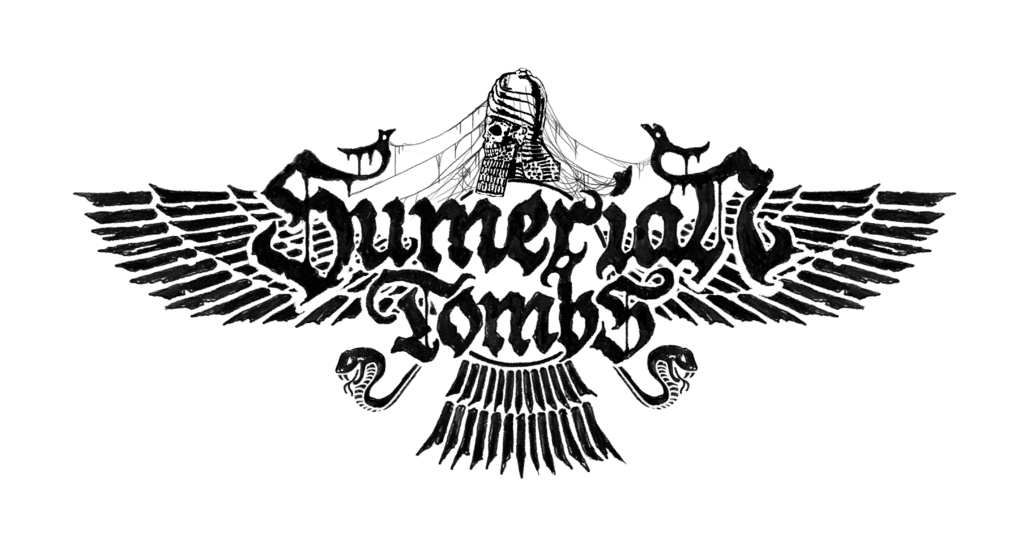
Greetings to the farthest lands encircled by Euphrates and Tigris! I hope that current circumstances of the global pandemic leave the spirits of Sumerian forefathers undisturbed during the recent past. The first and most immanent question – what initiated the rise from your crypts in West Germany?
K: Greetings from the necropolises Roman. Of course, the global pandemic has not spared us either. So we could release an EP, a short Dungeon Synth EP and our debut album but we couldn’t present them live yet.
Why did we stand up? Well, we know we have something to tell that has excited some out there so far. Especially since we also couldn’t play live with our main bands so far, we just had too much time and ideas.
It becomes very evident when listening into your releases that this is not your very first project. Hence, there is of course the question – regarding your line-up, are there any additional projects you play in?
I myself play guitar with Beltez and do the background vocals there. Quasi the same as with Sumerian Tombs. D. played with both Beltez and Sumerian Tombs until recently, but unfortunately had to leave both bands due to his family situation. W. sang with the Cologne melodic death metal band Valkyr until recently. M. plays drums with the black metal band Ius Talionis from Aachen and C. plays bass with the horror punk band Hellgreaser and the Cologne-based death metal primal rockers SKUM.
Regarding D. Yes, we are currently looking for a new drummer, preferably from the Cologne/Bonn area.
During the current pandemic, it still is a major struggle for a lot of bands to rehearse. Regarding the fact that you as a band came into existence specifically during the time of lockdowns and restrictions, what was it like to get started, find a rehearsal room and get together?
K: We actually haven’t rehearsed once yet. All the music has been written and arranged from home. Of course we met as a band to talk about some things, take photos and especially record a vocal demo in the beginning.
The idea behind the theme in your music is very salient when taking a look at your name and the covers of your releases. What is it that draws you towards ancient Middle East in general as a framework for the Black Metal you play?
K: Besides the fascination that we are talking here about with the oldest and first great empires of human history, we can combine this, in my eyes natural fascination, with a story about ancient Sumerian wind spirits, which in essence reflect the first form of a vampire. Musically, we still didn’t want to fall into a pure oriental scale, but just use these aspects purposefully.
When hearing allusions at Sumerian culture, one aspect that comes up quite often because of its importance is the epic of Gilgamesh. Did this epic have any impact on your songwriting, the arrangement of your songs or the choice of artworks and background?
K: The Gilgamesh Epic is an overarching literary story that has influenced not only the Middle East but also the Indian subcontinent. However, we prefer to tell our own story, which revolves around myths, demons and spirits. Maybe some ideas were sprinkled here and there concerning the lyrics on entering the underworld/ netherrealm…
The artwork of the demo “As Sumer Thrones at Night” (review here) showcases a depiction of the battle between Babylonian Gods Marduk and Tiamat – rather taking influence from an original drawing. The cover of your self-titled debut album shows a novel situation, though. Why did you decide to switch from an original depiction to a new constellation?
K: The artwork of the demo refers more to the fight of the first humans against the blood gods, making a visual reference to the demo’s lyrics. The cover of the debut album, on the other hand, shows the nameless pilgrim on his journey to the ruins to pursue precisely this older myth. Constructing this situation from old images was not an option for us, especially since we have a reliable partner for covers at hand in Ben Harff.
On the artwork of “Sumerian Tombs” (review here) we see a pilgrim holding a torchlight heading towards a Sumerian ziggurat. Most probably, this is the character that also sets the framework for the album. Are we able to find out what happens to this pilgrim on the trip towards the Sumerian tombs entirely or are there things we need to know beforehand in order to understand?
K: The pilgrim’s journey is described in the texts. I ask you at this point, read the texts and let this work. We will continue to tell the story on the next album, which we are already writing.
Is there any historical background that links the concept of vampirism that we rather associate with Victorian England to the tombs in ancient Babylon?
K: In fact, there is. The already mentioned wind spirits, Ekimmu or Edimmu, represent in their characteristics essential traits of vampires, which is why they have also found their way into new literature or even games with this designation. They are comparable with the Lamien of the Greek mythology.
The description of your music follows the term of “Epic Vampyric Black Metal” – which is quite precise already. Drawing influences from 2nd Wave Black Metal and epic elements of 1st Wave Black Metal such as Bathory – what are the elements that you consider the most striking to construct something that can be understood as Vampyric Black Metal?
K: In fact, it all depends on the type of band. Especially in Raw Black Metal many bands use this theme. Musically, in this genre I would rather describe the distant, echoed and thus unapproachable as a symbol for the vampiric. On the other hand, there are also bands that simply play raw black metal and have vampire lyrics.
Then there are newer bands like Order Of Nosferat, who sound very Finnish, but freshen this up with epic keyboard support. And of course the classics of Cradle Of Filth or Ancient, which reflect a very unique English sound in the genre.
We wanted to combine a good mix of Swedish Second Wave with the aforementioned Bathory epicness here, as we felt that this combination supported our story the best.
Although the description of your influences can be loosely traced back from the genres you mentioned – are there any specific influences that impacted the production of your debut album? Not only talking about definite albums but also artists regarding the cover or literature when talking about the lyrics or the entire concept.
K: In fact, we felt very free in our design of the concept. Lyrically, however, W can certainly say something about it!
W: When K first presented the first demo versions of the songs I had a rough idea on where the journey would take us/ the pilgrim. Since every song is basically a step further down into the netherworld I looked towards sources with a similar direction. Milton’s paradise lost, Tolkien (Lord of the Rings: e.g. the paths of the dead or the barrow-downs segments), Dante Alighieri’s Devine Comedy (Inferno) or the previously mentioned Gilgamesh Epic (especially tablets 6, 7 and 12). We are no historians or anything the like – therefor this is mostly fictional.
K: The cover represents the Tomb to which the nameless pilgrim in our story reaches. We told Ben from Kodex Barbaricus only the rough frame story and our vision of the cover, leaving him complete freedom in the realization. Since I had already worked with him on Beltez, I knew the result would fit.
On “As Sumer Thrones at Night” it was already evident that the guitar playing follows certain patterns that construct a Middle Eastern vibe – especially during the fast and aggressive tremolo lead melodies. Did you prepare to construct this sound by taking a deeper dive into Middle Eastern scales or did you rather focus on the reconstruction of the mere vibe when playing music?
K: Since I am a bad theorist on the guitar but rather build up my songs by feeling, I have not dealt with scales here before. As already described in the interview before, I was personally more concerned that the oriental theme is not musically emphasized too much. Other bands like Nile or Crescent have already done this enough and are still doing it successfully. I think that the mixture of the more direct, heavier songs of the demo and the melodic ones of the debut offers a good intersection for the future songs.
On “Altars of the Past” as well as “Vampyric Dominance” you have guest vocals by Zingultus (Endstille, Morast) and Vlad (The Crimson Ghosts). Were those contributions planned during the songwriting already or how did the mentioned musicians find their way into your music?
K: Definitely W can say more about that.
W: These contributions were not planned at all but fitted quite well during the song- and lyric writing process. K wrote that part in “Altars…” which had this strong back and forth dynamic and I thought: Why not a dialogue between gods and men which resulted in Zingultus embodying the spirits/ gods/ entitys.
With “Vampyric dominance” there was this gap at the end needed some what of an exclamation mark: Enter Vlad!
I know both guys for quite some time now. Vlad as a fellow “Cologne-ian” and Zingultus from a few run-ins and just simply asked if they would join in on the effort.
The tape label that released your demo – Helhallen – was quite young when having released it. More specifically, going by the catalogue number of the release (HHT-001) it seems as if that demo marked the first official release. How did you get in touch with the label?
K: The studio we recorded at had the idea of releasing tapes of the bands that record with them and seem interesting enough to handle this still rather specialized medium. The advantage was that we could also record our own analog 8-track mix both for the demo and as a supplement for the album. Especially with the album, this is a very nice thing to do, as the 8-track mix has a sound aesthetic all its own that probably seems better and more appropriate to some. And yes, we were among the first. There was actually then HHT-000 for The Barrow Downs, as that was slipped in between. So we are the second release from the label.
It felt as if instantly after the release of “As Sumer Thrones at Night” it was already clear that the full-length was going to follow on Ván Records. Was the intention to follow up with a full-length already present during the release of the demo or how did the planning of the release proceed regarding the communication with Ván Records?
K: We actually went the other way on the release. We first had 30 minutes of demo songs that we presented to Ván Records. Since it was agreed very quickly about a joint release but they would like to have a full album, we had written “The Key – Bloodmeditation” and “Altars Of The Past” afterwards. Due to the long waiting times at the pressing plants, we still had enough ideas and enough time to bring forward the EP “As Sumer Thrones At Night” and thus already had a prequel to the story. The songs of the EP seem more impetuous but in fact this results from full intention, because this impetuousness fits thematically to the story. The fact that we had inserted the Dungeon Synth EP in between, had above all the purpose to help the friend of our booker a little bit, who stood with her family after her escape from the Ukraine first of all before the nothing.
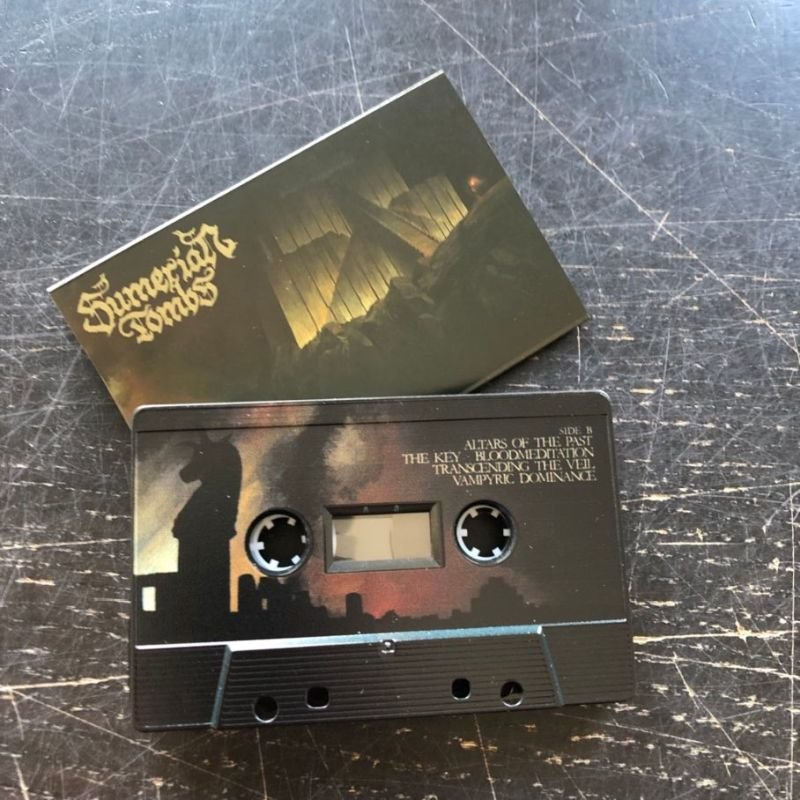
There were two versions of “Sumerian Tombs” released on vinyl via Ván Records as well as on tape via Helhallen. What exactly is the difference between those versions and why did you choose to proceed with those two alternatives?
K: We need to make something clear here. The tape also comes via Ván Records, but was produced by Helhallen. In essence, Helhallen remains our partner in crime.
What are the plans for Sumerian Tombs regarding the upcoming concert season as well as future songwriting? Are there any specific plans already?
K: Yes, so far our debut live show at De Mortem Et Diabolus in Berlin at the end of the year is set. In 2023 we definitely want to play more. But in the meantime we are on the road with our main bands Beltez, Hellgreaser or Ius Talionis.
Thanks a lot for your time – the last words shall belong to you.
K: Wow, those were a lot of exciting questions. Thanks for the support and see you live soon!

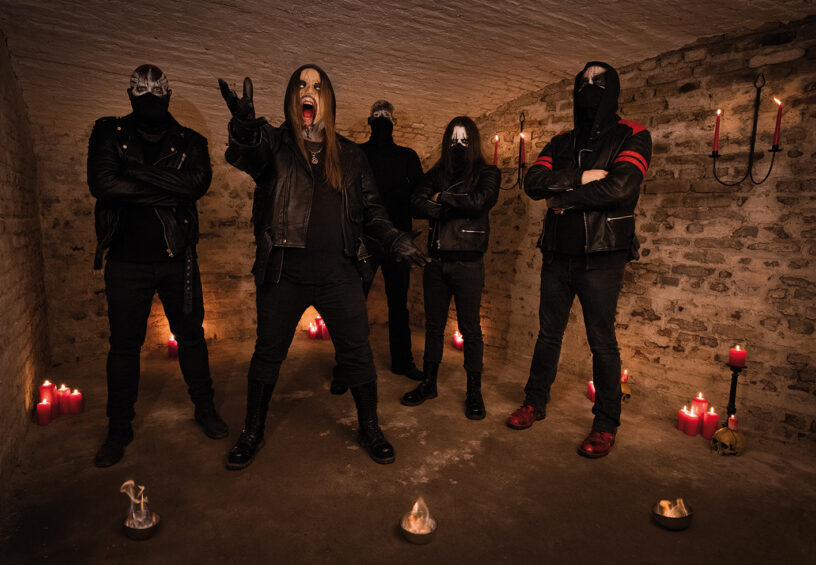
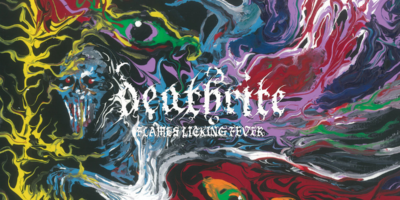
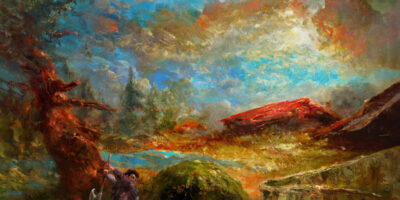
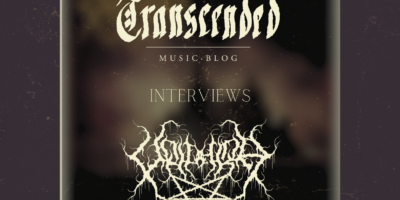
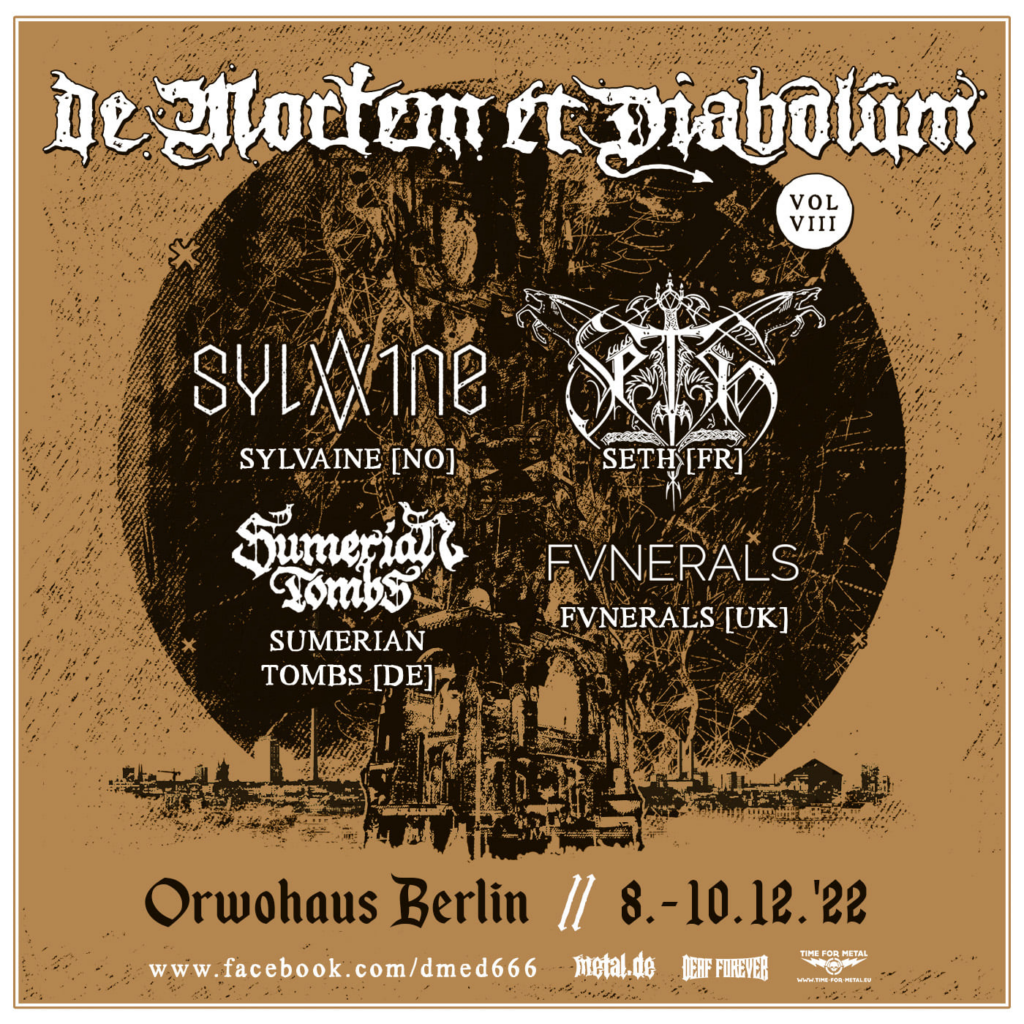
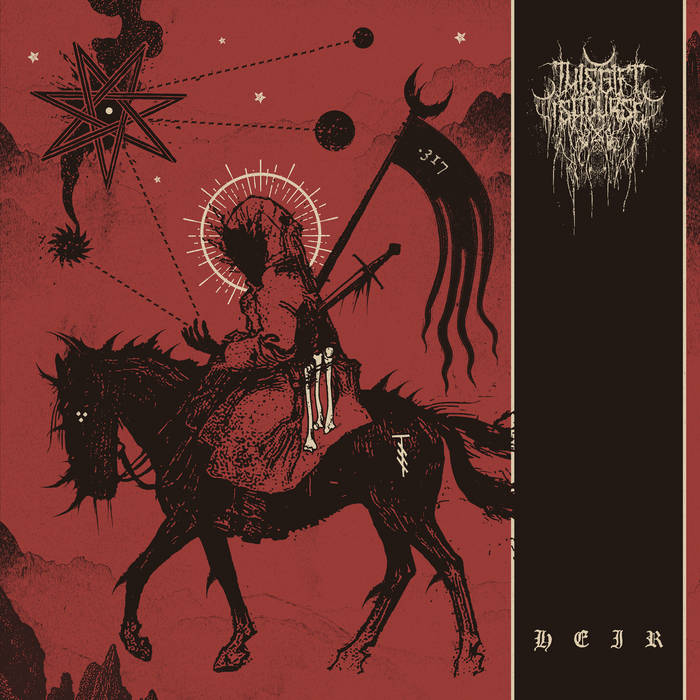
Leave a Reply